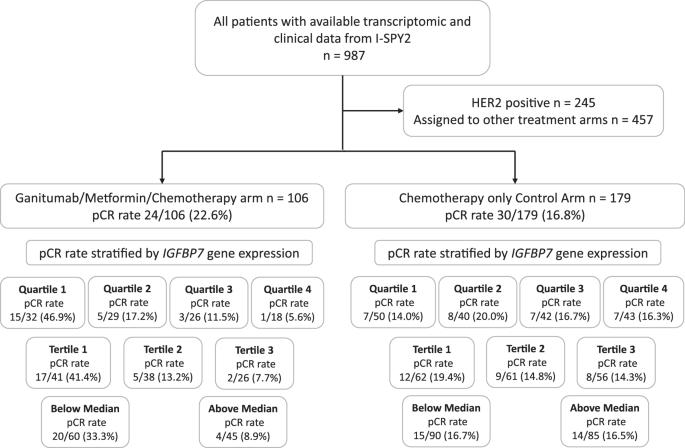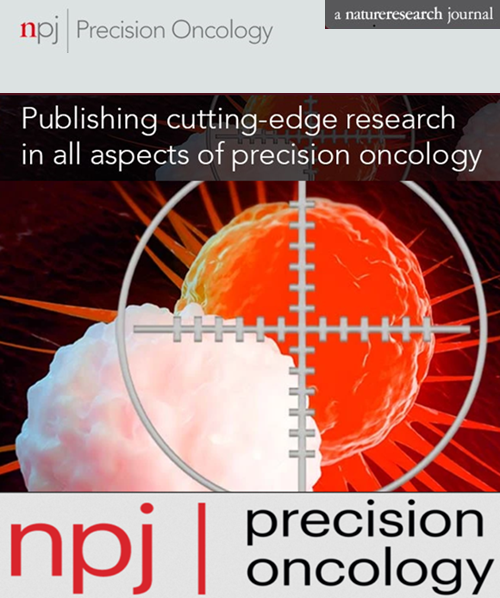靶向IGF-IR可提高IGFBP7低表达乳腺癌的新辅助化疗疗效。
IF 6.8
1区 医学
Q1 ONCOLOGY
引用次数: 0
摘要
由于 1 型胰岛素样生长因子受体(IGF-1R)信号系统在肿瘤增殖和存活中的关键作用,人们长期以来一直对靶向治疗乳腺癌感兴趣。然而,没有一种 IGF-1R 靶向药物在 3 期对照试验中显示出实质性的临床获益,也没有生物标志物被证明在预测 IGF-1R 靶向药物的获益方面具有临床实用性。IGFBP7 是一种非典型的胰岛素样生长因子结合蛋白,因为它与 IGF-1R 的亲和力高于 IGF 配体。我们报告说,低 IGFBP7 基因表达确定了一个乳腺癌亚群,与单纯新辅助化疗相比,在新辅助化疗中加入抗 IGF-1R 单克隆抗体甘尼妥单抗可大幅提高病理完全反应率。在化疗加加尼妥珠单抗治疗组中,IGFBP7表达量最低四分位数患者的病理完全反应率为46.9%,而表达量最高四分位数患者的病理完全反应率仅为5.6%。此外,IGFBP7的高表达预示着远处转移风险的增加。如果我们的研究结果得到证实,就应该重新审视停止开发 IGF-1R 靶向药物的决定,因为这些决定是基于之前未使用预测性生物标记物的试验的令人失望的结果做出的。本文章由计算机程序翻译,如有差异,请以英文原文为准。

Targeting IGF-IR improves neoadjuvant chemotherapy efficacy in breast cancers with low IGFBP7 expression
There has been a long-standing interest in targeting the type 1 insulin-like growth factor receptor (IGF-1R) signaling system in breast cancer due to its key role in neoplastic proliferation and survival. However, no IGF-1R targeting agent has shown substantial clinical benefit in controlled phase 3 trials, and no biomarker has been shown to have clinical utility in the prediction of benefit from an IGF-1R targeting agent. IGFBP7 is an atypical insulin-like growth factor binding protein as it has a higher affinity for the IGF-1R than IGF ligands. We report that low IGFBP7 gene expression identifies a subset of breast cancers for which the addition of ganitumab, an anti-IGF-1R monoclonal antibody, to neoadjuvant chemotherapy, substantially improved the pathological complete response rate compared to neoadjuvant chemotherapy alone. The pCR rate in the chemotherapy plus ganitumab arm was 46.9% in patients in the lowest quartile of IGFBP7 expression, in contrast to only 5.6% in the highest quartile. Furthermore, high IGFBP7 expression predicted increased distant metastasis risk. If our findings are confirmed, decisions to halt the development of IGF-1R targeting drugs, which were based on disappointing results of prior trials that did not use predictive biomarkers, should be reviewed.
求助全文
通过发布文献求助,成功后即可免费获取论文全文。
去求助
来源期刊

NPJ Precision Oncology
ONCOLOGY-
CiteScore
9.90
自引率
1.30%
发文量
87
审稿时长
18 weeks
期刊介绍:
Online-only and open access, npj Precision Oncology is an international, peer-reviewed journal dedicated to showcasing cutting-edge scientific research in all facets of precision oncology, spanning from fundamental science to translational applications and clinical medicine.
 求助内容:
求助内容: 应助结果提醒方式:
应助结果提醒方式:


